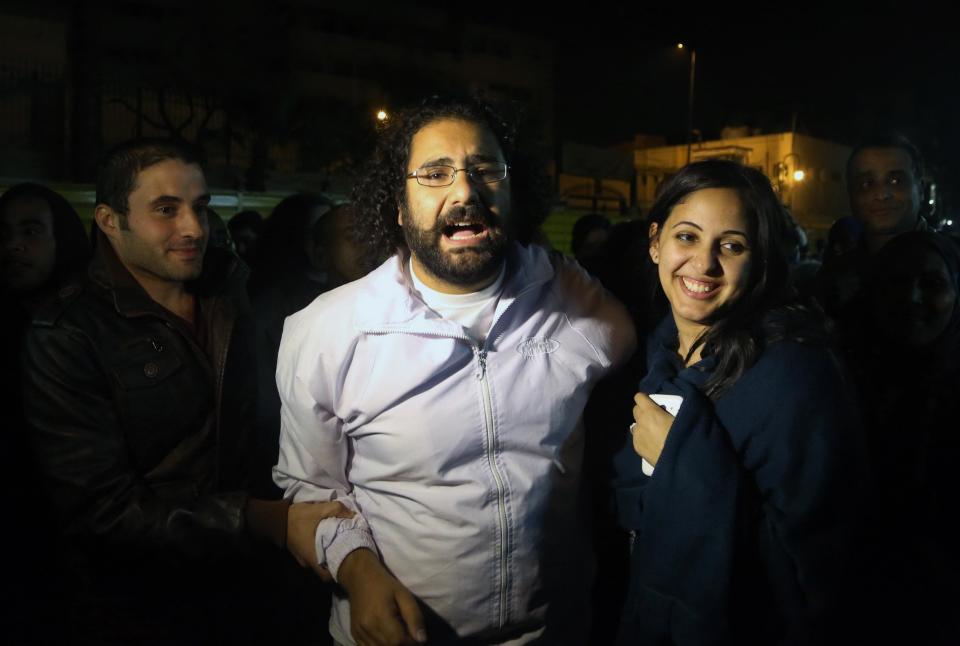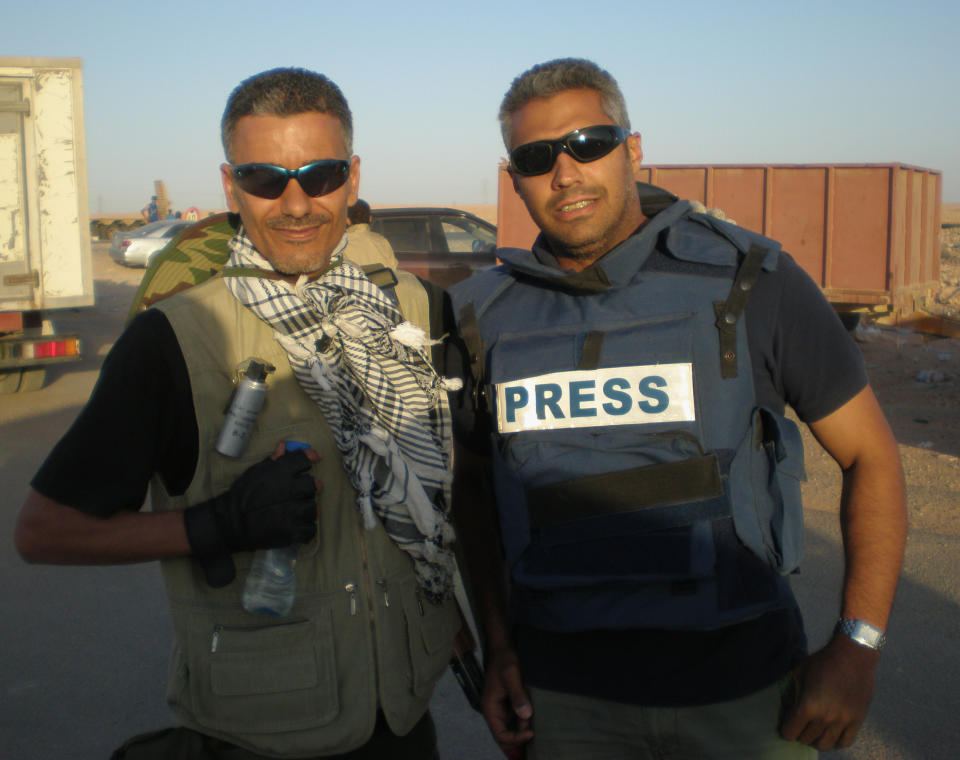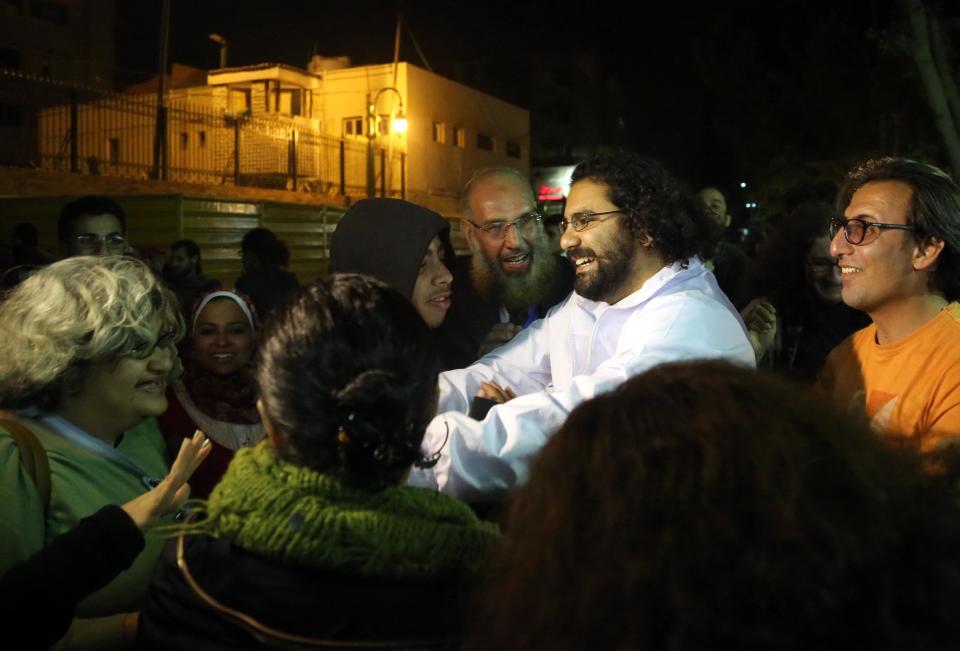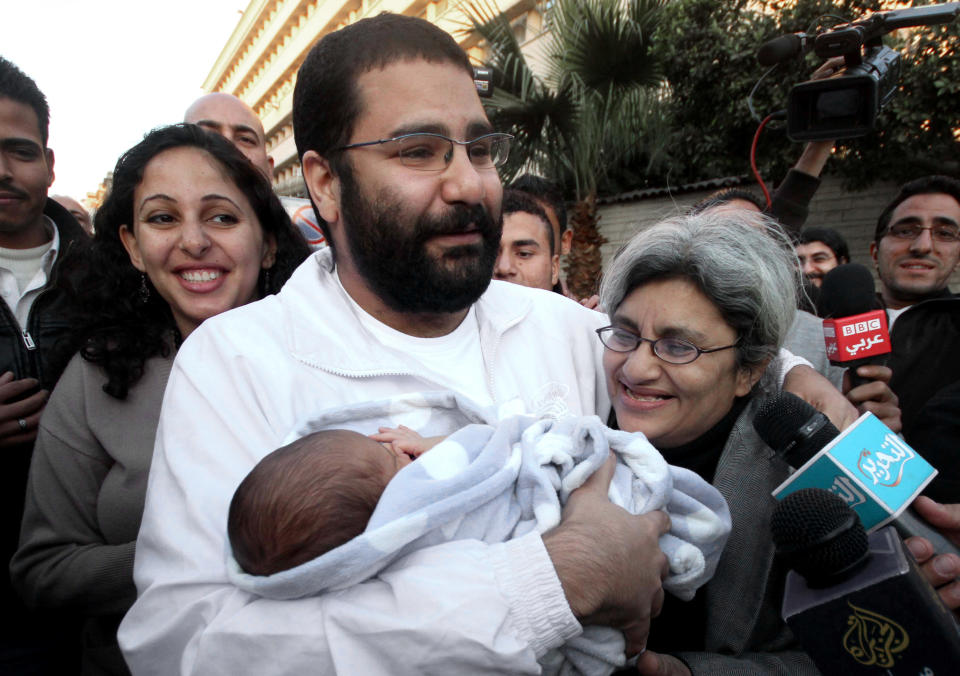Egypt: Court orders leading activist freed on bail
CAIRO (AP) — An Egyptian court on Sunday ordered the release on bail pending trial of a prominent activist charged with breaking a new law that heavily restricts protests, after he spent nearly four months in jail.
The case against Alaa Abdel-Fattah and 24 other defendants was criticized by rights groups. It was seen as part of a sweeping clampdown by authorities on dissidents, widening an already ongoing crackdown on Islamist supporters of the ousted President Mohammed Morsi to include the secular opposition.
Egyptian authorities arrested Abdel-Fattah, a leading figure in the 2011 uprising against autocrat Hosni Mubarak, in November. He was charged with organizing a protest without permission and assaulting police.
At Sunday's opening hearing of Abdel-Fattah's trial, lawyers called on the judge to release Abdel-Fattah and the only other defendant imprisoned in the case, Ahmed Abdel-Rahman, saying there was no reason for their continued detention, hinting it amounted to a punishment.
The presiding judge Mohammed el-Fikki, agreed, ordering their release and set bail at 10,000 Egyptian pounds (about $1,400). The court adjourned the proceedings until April 6.
The defendants and lawyers broke out in chants: "Revolutionaries and free, we will continue our journey!"
Egyptian courts are currently swamped with legal cases against thousands of defendants arrested in the past eight months on various charges, from violating the protest law to waging a campaign of violence against security and state institutions. Morsi and leading members of his Muslim Brotherhood are also facing more serious charges such as conspiring with foreign groups to destabilize Egypt and inciting murder.
With so many court cases going on simultaneously, lawyers and rights groups express concern about the fairness of such trials.
Ahmed Seif, Abdel-Fattah's father and lead lawyer, said his release was welcomed as a "start on a long road to try to guarantee justice." He said the deeply polarized political environment makes such prospects unpredictable.
Justice "has become like rolling the dice. It depends on so many other things, not including the rule of law or how clever the defense is."
The case of Abdel-Fattah has, however, gained particular attention. It was the first case filed since Morsi's ouster against secular activists, many of whom were vocal critics of the Islamist president and called for his stepping down. The case was also the first moved against protesters for violating the law adopted in November by the government— explaining that it needed to regulate continued street protests.
Three other prominent secular activists have since been sentenced to three years for violating the law since Abdel-Fattah's arrest, in December.
The New York-based Human Rights Watch said in February that Egyptian authorities have "demonstrated almost zero tolerance for any form of dissent," adding that the crackdown included journalists, demonstrators, and others who express their opinions on Twitter.
Like many of his peers from the 2011 uprising, Abdel-Fattah was opposed to the rule of Morsi. But Abdel-Fattah, again like many young secular and liberal Egyptians, was soon disillusioned by the policies adopted by the military and the government it has backed since.
One of their primary criticisms is what they see as the recreation of Mubarak's 29-year regime, a time defined by corruption, pervasive security agencies and a brutal police force. They also have criticized the sweeping crackdown on Morsi's Muslim Brotherhood as part of a campaign that has jailed thousands. Additionally over one thousand — many more, according to some estimates — have been killed in political violence.
On Sunday, pro-Morsi students at the Islamic university of al-Azhar kept up their near daily protests against authorities, this time using steel bars to break down a wall erected by the administration recently to contain their rallies.
Mohamed Atef, a student leader, said the walls were built to "control student demonstrations inside the university." Police dispersed the protesters with tear gas and bird shot.
Meanwhile, at Cairo University hundreds students rallied demanding the release of detained colleagues. University students have been at the lead of the anti-government protests.
Authorities say the crackdown against the Brotherhood is necessary to defend the nation against a campaign of terror by militants linked to or sympathetic with the Brotherhood. The group denies it practices violence.
Abdel-Fattah's release comes as the date for the presidential election is near. The country's military chief, Field Marshal Abdel-Fattah el-Sissi, is widely anticipated to run.
He has hinted strongly he intends to run, a move seen by the nation's secular activists as confirmation that the ouster of Morsi has restored the rule of the military. The powerful institution has been the source of all of Egypt's presidents — except Morsi — since the overthrow of the monarchy about 60 years ago.
Abdel-Fattah, also a blogger, is not new to being jailed by authorities. He was imprisoned under Mubarak, the interim military rule following Mubarak. An arrest warrant was also issued against him during Morsi's rule.
Before Sunday's ruling, Abdel-Fattah, speaking from inside the defendants' cage, said: "I want to go home to my son." His son was born during a two-month detention under the transitional military council rule in 2011. "Detention before (my son) Khaled is totally different than after he was born."
Abdel-Fattah was arrested from his home on Nov.28, and he and his wife accuse police of attacking them during the arrest. Abdel-Fattah denies he has called for the protest for which he is charged, and which he didn't attend.
His latest imprisonment, he recently wrote from jail, was a sign of the "miserable" state of the revolution.
In a letter to his two sisters, also activists, he said he spent most of his day in solitary confinement.
"What adds to my feeling of oppression is that I feel this particular lock up has no value. This is not struggle, and there is no revolution," he wrote in the note that was published in January.





